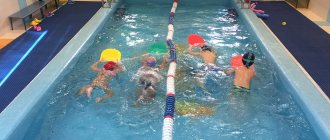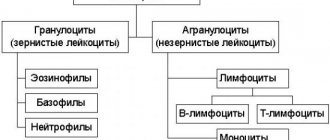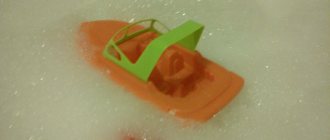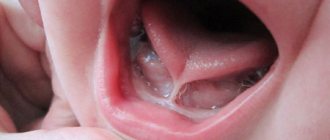The slogan “Swim before you walk” is very popular among modern young mothers. Everyone knows that staying in water at a comfortable temperature has an extremely beneficial effect on the well-being of a small child up to one year old. You can teach your baby to swim in a large bathtub at home or in a children's pool. In the latter case, for the visit you will need to collect the necessary documents confirming the absence of infectious diseases in the child and his mother.
A child knows how to swim from birth, this skill can be developed
The benefits of swimming for babies
Any healthy baby can swim from birth, because this is what he does for nine months in the womb. However, once the baby is born, the innate swimming reflex may fade. To prevent this from happening, you need to train daily. To do this, you can go to the pool, where there are groups for young mothers and children under one year old.
It’s worth a try, because swimming has a variety of positive effects on the child’s body:
- Promotes complete muscle relaxation;
- Reduces intestinal colic and promotes the active release of gases in children up to three months;
- Strengthens the emotional connection between child and mother;
- Strengthens the nervous system and makes the baby calmer;
- Improves sleep;
- Reduces intracranial pressure.
Experts say that children who spend a lot of time in water from infancy subsequently begin to sit, crawl, and roll over earlier than their peers. Swimming also saturates the lungs with oxygen and improves appetite, the child begins to grow faster and gain weight. The good thing about a swimming pool is that, unlike a bath, a child can swim in it with his mother.
It is known that swimming has a beneficial effect on the condition of the spine and the formation of posture
Additional inventory
Goggles
The products will protect your eyes from water and chlorine. With swimming goggles, your baby will be able to easily dive, swim and navigate underwater. Choose models with soft frames and padding, a tight and comfortable fit. Pool glasses must be made of high-quality and reliable materials that will not cause allergies. They should be easily adjustable and not put pressure on the bridge of the nose and head. Models with anti-fog glass treatment are well suited.
Pool fins
Such products will help the child develop high speed, practice and form the correct body position in the water, work out the leg muscles, flexibility of the ankle and feet, increase endurance and improve swimming technique. Your baby will begin to swim with fins faster and more confidently. They will come in handy not only in the pool, but also in the sea or any other body of water. To choose fins for a child, pay attention to the size and fullness of the products. Buy models with a reserve.
Swimming sticks and boards
Auxiliary elements for exercises in the pool. They are needed for children who do not yet know how to swim, have trouble staying on the water or are afraid to swim. Such products are used for first visits to the pool. The board will help you practice correct body position in the water, increase endurance and tone your legs.
Kolobashki strengthen the arms and upper body. They will help you practice your hand stroke technique. Today, 2-in-1 models are made that combine the functions of both boards and bowls. For a pool, it is better to choose foam products. And for trips and trips, inflatable models are suitable.
An inflatable ring and arm sleeves provide additional confidence in the water for children who are not yet good swimmers. There is no need to take the first one into the pool. But armbands are acceptable. However, swimming in them is quite uncomfortable. Often children completely refuse to swim in armbands. Plus, you learn to swim slower with them.
Front tubes
These are hydrodynamically shaped training tubes that will help you breathe under and in water. They are located in the center of the head. The products will help you not to be distracted by breathing and concentrate on your swimming technique. They train endurance and increase lung capacity. Choose models where you can adjust the length of the strap and the height of the headrest to ensure comfortable and convenient use of the tubes.
Check with the coach in advance what additional equipment your child will need for the pool. Often, modern centers already have all the necessary elements, including sleeves, boards, kolobaski, and so on.
When you have collected the necessary things, choose a comfortable bag or backpack for your baby. Choose products that are waterproof, lightweight and compact, durable and reliable. Models with separate compartments for wet and dry items are suitable.
Subscribe to our VKontakte group
Contraindications for visiting the pool
There are many contraindications for visiting the pool, for example:
- Any skin diseases (eczema, dermatitis, diaper rash);
- Chronic otitis and sinusitis;
- General poor health of the baby (drowsiness, lethargy);
- The period of teething is the time when the child becomes especially susceptible to any infectious diseases.
What tests are taken from newborns in the maternity hospital before discharge?
Also contraindications are any gastrointestinal disorders: diarrhea, vomiting or loose stools. For chronic constipation, a swimming pool, on the contrary, is recommended, because active movements in the water activate intestinal motility. Under no circumstances should you go into the pool with your baby immediately after breastfeeding or formula feeding, because during swimming the baby may burp profusely. The best time to go is about forty minutes before the next feeding.
If you have to get to the children's sports center by public transport, in late autumn and early spring, when the incidence of acute respiratory infections peaks in most large cities, it is better to stay at home and train in the bath so that the child does not get sick from prolonged contact with a large number of people.
Attention! It is strictly forbidden to visit the pool with your baby if the child has a runny nose, cough, fever or other signs of an acute respiratory infection. In this case, even the slightest hypothermia can lead to complications such as otitis media, sinusitis or even pneumonia. Therefore, if a child is often sick, it is better to choose a pool where, when purchasing a subscription, the fee for missed classes is refunded.
What tests are required?
Toys for boys under one year old - which ones are best?
Tests for a child's pool include tests for enterobiasis (pinworm eggs) and helminth eggs (worms). Also at the pool they may ask:
- A copy of the baby’s birth certificate and mother’s passport;
- A certificate for the mother from the gynecologist stating that she does not suffer from sexually transmitted diseases;
- A certificate for the mother from a dermatologist stating that she does not have any contagious skin diseases;
- Permission to visit the children's pool from the local pediatrician.
It’s better to put all documents in one plastic folder or file, so they definitely won’t get lost. It is not necessary to bring originals of personal documents; copies of them are sufficient. Having prepared all the papers, you can start collecting the necessary things.
To visit the children's pool, an infant under one year of age must wear a special waterproof diaper to prevent contamination of the waters during the session. You should also take with you a disposable absorbent diaper, a comfortable terry towel with a corner hood and a flannel cap so that the baby is not bare-headed after leaving the water. In case the child gets hungry, you can take pre-diluted milk formula in a thermos container or at least a bottle of boiled water. To make swimming more fun for the baby, some parents take rubber toys or rattles with them.
Only healthy children and adults are allowed into the swimming pool
Attention! The validity period of the tests is limited, so it only makes sense to go and take them if the parents have already decided exactly on the pool and the time of the first visit.
At what age can you go to the pool?
Today, a child can start swimming as early as two months, of course, together with mom or dad and under the supervision of a certified instructor. The main thing is that the umbilical wound is completely healed and there are no contraindications. This kind of infant swimming has gained great popularity among modern parents.
You can teach a child to swim consciously after five years. Here he already understands and completes tasks, can accept criticism and correct mistakes, and master the correct swimming technique. But many pools today offer groups from three to four years old, where children swim in mini-groups under the strict supervision of a coach.
Choose groups with a small number of people, where children will be approximately the same age and level of training. In any case, you must first visit a doctor with your baby. Not only to obtain the appropriate certificate. But also to make sure that the baby is healthy and ready to swim.
Where to get a certificate for a swimming pool
Why do you need an allergen test for a child under one year old, how to donate blood
It happens that a mother knows what certificates her child needs for a swimming pool, but does not know who to contact for them or where to get tested. You can get the necessary certificate to visit a public swimming pool from your local pediatrician or from a paid clinic. First of all, the child’s parent should contact the local pediatrician at their place of residence. If the doctor does not find any contraindications for early swimming lessons, he will give access to the pool and a referral to take tests, for example, to the Invitro laboratory, although tests can also be taken at a children's clinic. For her certificates, the mother must contact the adult clinic to which she is assigned.
Applying for documents to a private medical center allows you to significantly save time and avoid standing in long, tedious queues. However, in this case, you will have to pay for each individual procedure, even if you have a compulsory health insurance policy.
Sometimes young mothers, hoping to save time and money, turn to doctors they know for fake certificates for themselves and their children. This is categorically not recommended, because forgery of documents in Russia provides for criminal liability. Therefore, you should not be tempted by dubious advertisements in newspapers or the Internet, promising to make any certificate in absentia in 15 minutes. The best option is to see a doctor for a referral, get tested the next day and immediately receive the necessary document.
How to get a certificate and is it free?
You can arrange it in one of the following ways:
- in the clinic at your place of residence;
- in a medical center;
- in some pools;
- apply through the website.
Why did most citizens pay for this service? The answer is simple: it is not included in the basic compulsory health insurance (CHI) program. But there are exceptions. The document is issued in a state clinic upon presentation of a compulsory medical insurance policy free of charge:
- Children, if classes take place at the school or kindergarten where he studies.
- Adults, when swimming is recommended by a doctor’s report based on the results of a medical examination or medical examination.
Validity period for a child's certificate
The validity period of children's and adult pool certificates is on average three months, or 90 days. However, some medical institutions issue a document for a period of six months. The validity period of the document is usually indicated in its text.
Before collecting documents for a swimming pool for a baby under one year old, you should consult your pediatrician. Perhaps the doctor will find contraindications for early swimming lessons in your baby. It is also worth consulting with a neurologist and orthopedist. If there are no contraindications, but the baby feels uncomfortable, you need to change the children's pool or temporarily postpone classes, continuing them when the child grows up.
Swimming in the pool
What does the legislation say? Adults go swimming!
According to the latest established requirements of SanPiN, in 2021, when visiting a swimming pool, adults can be asked for a medical certificate only in one case, when an unfavorable sanitary and epidemiological situation arises in the city.
The State Sanitary and Epidemiological Supervision Authority issues an order and distributes it to all swimming pools. Then the Administration has the right and even the obligation to request a certificate from an adult visitor.
The establishment of a prescription occurs when there is a widespread or danger of the spread of an infectious disease transmitted through water. The full list is contained in Appendix No. 2 to SanPiN 2.1.2.1188-03.
In all other cases, the requirement for a certificate is illegal.










